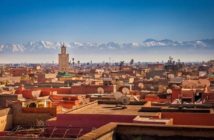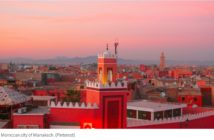BR teen studies Arabic in immersion program
BY CAROL ANNE BLITZER
Advocate staff writer
After a summer studying Arabic in Morocco, Jane-Elise Ryer is certain she wants to pursue at least a minor in Middle Eastern Studies or Islamic World Studies.
The 17-year-old from Baton Rouge is a boarding school senior at Verde Valley International School in Sedona, Ariz. She had an experience of a lifetime in a six-week immersion program in Marrakech through the National Security Language Initiative for Youth, a State Department initiative.
“After 9-11, people realized that a lot of people don’t speak Arabic or other crucial languages, like Chinese, Korean and Farsi, so they started making programs for high school students to learn those languages,” Ryer said. “The programs get money from the government for people to learn these languages.”
All expenses are provided for students participating in NSLI-Y programs. “That includes airfare and lodging,” Ryer said.
She was selected for the program after a phone interview in which she discussed her interest in languages. “They send people all over the world,” she said. “They give you choices. My top choice was Arabic. Sometimes you apply for Korean and get Chinese.”
The students selected for Morocco were flown to Washington, D.C., on June 15. There were 40 in the group divided between two cities, 25 to Marrakech and 15 to Rabat.
This summer was Ryer’s second immersion program in Arabic. The previous summer, she had attended STARTALK Arabic Camp at Brigham Young University. According to the STARTALK website, the program, also a component of the NSLI-Y, was established in January 2006 to “expand and improve the teaching and learning of strategically important world languages that are not now widely taught in the U.S.”
“I spoke a little bit of Arabic (when I first got to Morocco),” Ryer said. “I could say, ‘Can you take me home in a taxi’ or ask someone for a Coke. In Morocco, they have corner stores. You have to ask someone to get things for you. You can’t just grab what you want.”
In Marrakech, Ryer and another young woman in the program were assigned to a family — a mother, father, three daughters and a 5-year-old boy. “They were the sweetest family ever,” Ryer said.
Her days in Morocco were completely different from life in America. She woke up every morning at 7 and would go to class, where she stayed until 5 p.m. with a three-hour break for lunch at the school.
“I was expecting humus and shawarma, but the food was different,” she said. “I was expecting spicy food, but Moroccans do not do spicy at all from what I could see.”
At the end of the school day, she would take a taxi home or the oldest daughter in her family would pick her up. That’s when the fun began. She, her roommate and the two oldest daughters in the family would go to the plaza, a mall of European stores, or to the Medina, Marrakech’s old city.
The Medina contains some dirt streets that are frequently watered down to keep the dust from being stirred up. “It was nice and muddy,” she said. “It somewhat brought you back to old Marrakech, but there were really modern things being sold in the Medina.”
The girls returned home at 11 p.m. for dinner. “Moroccan families eat their dinner late, around 10ish,” Ryer said. “One family had dinner at 1 a.m. every night.”
Ryer said she never once felt hungry until Ramadan because her Moroccan mother was a wonderful cook. “Guests are made to feel welcome,” she said. “They give you lots of food.”
Even though Ryer was learning Arabic, the Arabic of the classroom was not the dialect of the family. In class, the students learned Fus’ha Arabic, or Modern Standard Arabic, an eloquent language used in writing and formal speech. At home, most families speak Darija Arabic, the colloquial Moroccan dialect.
“The sister I got closest to in the house spoke about as much English as I spoke Arabic, so we spoke French,” Ryer said. “I could communicate some in Darija, but I spoke to my family in French most of the time.”
Summers in Morocco are hot, especially since most homes are not air-conditioned. “It was like 115 every day,” Ryer said. “It was kind of fun because all of the girls would sleep on the roof.”
Ryer was able to experience Ramadan, which started in Morocco on July 20, the last Friday of her program. Ryer found that people seemed nicer during Ramadan.
“I really liked Ramadan,” she said. “No food or water passed the lips from sunrise to sunset. The fasting part was really hard for me. We were not forced to fast, but when we broke the fast, the food tasted really good.”
Iftar, the break fast meal, included a soup, eggs and dates. “That is the traditional iftar, but my family would add stuff to that,” she said.
Because the law in Morocco forbids non-Muslins from entering mosques, Ryer would watch from a distance the comings and goings at the Koutoubia Mosque, the largest mosque in Marrakech. Because so many people were attending services, the crowds would spill out into the courtyard.
“It was really beautiful to see all the bodies moving in unison praying. It was just beautiful,” she said.
Ryer is the daughter of Olga Hayward-Ryer, a textbook consultant and job skills teacher. Her father, William Ryer, a petroleum engineer, was killed while he was working in Nigeria seven years ago. He had served in Marine Corps intelligence as an interpreter during the Vietnam War.
Jane-Elise Ryer studied French as a student at St. James Episcopal Day School and later at the LSU Lab School. For four summers she attended the Concordia Language Villages in Hackensack, Minn., to improve her French fluency.
“Two years ago, I decided to go away to school,” she said. “I had lived in Baton Rouge all my life. Baton Rouge is a nice city, but I wanted to see more of life.”
This will be her third year at Verde Valley International School. She graduates in June. College is next. “I just want to see what my major will be,” she said. “Probably something like public health.”
Print article
RESOURCES
Letter to the editor
Send a letter to the editor to voice your opinion.
BR Homicides Maps
Maps listing homicides or suspected homicides in EBR Parish for 2011 and 2010.
Gas Prices in BR
Current gas prices in BR area.
Governmental Links
Important local, statewide offices.
2012 Area Graduates
BLOGS
LSU Football
Louisiana Politics
LSU Baseball
Southern Sports
Saints Football
NEWSLETTERS
Breaking News Alerts
Breaking Sports Alerts
The Advocate’s Daily Digest
Please log in to comment on this story
Comments (1)
1) Comment by TLS – 08/22/2012
Contact Us
dailydeals.theadvocate.com
classifieds.theadvocate.com
jobs.theadvocate.com
homes.theadvocate.com
wheels.theadvocate.com
shop.theadvocate.com
pets.theadvocate.com
Copyright © 2012, Capital City Press LLC • 7290 Bluebonnet Blvd., Baton Rouge, LA 70810 • All Rights Reserved
Terms of Use | Privacy Policies | Supported browsers | Newspaper Archives | Media Kit
.






